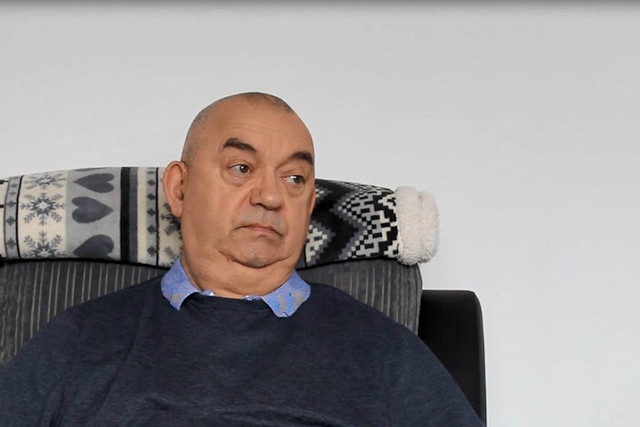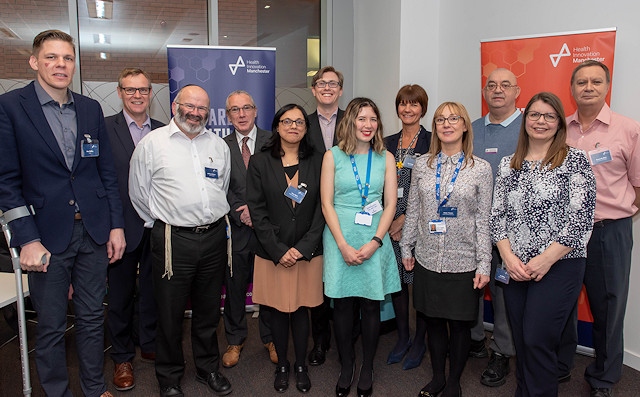Ambitious plans to revolutionise dementia care and early detection in Greater Manchester supported by Rochdale man living with the condition
Date published: 05 April 2019

Alan Mills, from Rochdale, who is living with dementia, explains why he believes there needs to be more awareness in Greater Manchester
Ambitious plans to raise awareness of dementia and improve care for people within Greater Manchester are being supported by those living with dementia.
In 2018, leaders from Health Innovation Manchester and Greater Manchester Health and Social Care Partnership signed a partnership agreement with the Dementia Industry Group, which is made up of representatives from the UK’s pharma industry and Alzheimer’s Research UK.
A year on from the agreement, which is thought to be the first of its kind in the UK, Greater Manchester is working on a new dementia pathway which aims to raise awareness of dementia and detect the early symptoms so people can get a diagnosis and access to support sooner.
Alan Mills, from Rochdale, was diagnosed with early onset Alzheimer’s four years ago and said he supports the idea of raising awareness in Greater Manchester.
The 66-year-old said: “I noticed something was different when I couldn’t remember things I’d always known. But it was more than that I couldn’t remember them, things had just disappeared, and it didn’t matter how hard I tried to remember them, they just didn’t come back.
“I’d heard that swimming was good for your health and wanted to give it a go. I got down to the pool, even remembered a coin for the locker, and got into the water. But once I was in, I couldn’t remember how to swim at all. I stayed in the water for 10 minutes, just to save embarrassment, before I left. And I’ve not been swimming since.”
He added that he can no longer remember how to tie a tie, despite wearing one all of his working life, and has experienced issues with his speech.
“I went to the doctor and the memory clinic before a specialist diagnosed early onset Alzheimer’s and they gave me five to seven years” Alan continued.
“When I was diagnosed, I didn’t believe it and I didn’t know how to act or what to do next. I tried to take it calmly, but I felt the same as everyone else does when you’re given a terminal diagnosis – why me?”
Alan added that he wants to see those diagnosed with dementia given support and help to ensure the best possible experience as soon as they are diagnosed. This includes providing more education to the public about spotting the signs of dementia and using stories like his to explain what it is like to live with dementia.
He continued: “I’d like to see dementia discussed on the television as much as cancer is. People don’t understand enough what dementia is – they compare it to forgetfulness or short-term memory loss.
“I think it’s important that that people with dementia are given a voice and are able to share their experiences to help raise awareness and educate the public.”
Dementia is one of the greatest health challenges facing Greater Manchester. It is estimated that there are currently more than 30,000 people living with dementia in Greater Manchester and the city region spends £270 million a year treating and caring for people with the dementia.
People with dementia experience continued decline in how the brain functions and are likely to experience a range of symptoms including memory loss, difficulty carrying out daily tasks, changeable moods and unpredictable behaviour.

As part of its Dementia United strategy, the city region has an ambition to be the best place for people to live with dementia in the world.
Greater Manchester’s partnership with industry is focused on finding the best care and treatment options for people with dementia, as well as identifying people who are at risk of developing the disease.
It involves looking at ensuring medication is prescribed correctly and developing new treatments whilst also preparing the system in Greater Manchester to respond quickly when these new treatments become available. The partnership is also exploring how Greater Manchester can maximise the benefits of new technologies and digital innovations can improve people’s quality of life.
Professor Ben Bridgewater, Chief Executive of Health Innovation Manchester, said: “As Alan’s story shows, living with dementia can be distressing for the individual and their family or carers. It is crucial that we raise awareness of dementia so more people can spot the early symptoms while we work across the system and with industry to find better treatments and ways to provide better care.”
Do you have a story for us?
Let us know by emailing news@rochdaleonline.co.uk
All contact will be treated in confidence.
Most Viewed News Stories
- 1Police seize £48,000 in Rochdale property search
- 2The plan for two new apartment blocks with an unusual car parking system
- 3Andy Burnham responds to harrowing reports from hospital nurses
- 4The museum undergoing £8.5m transformation now needs a new roof
- 5£1.31 million boost for Rochdale families through Start for Life initiative
To contact the Rochdale Online news desk, email news@rochdaleonline.co.uk or visit our news submission page.
To get the latest news on your desktop or mobile, follow Rochdale Online on Twitter and Facebook.

